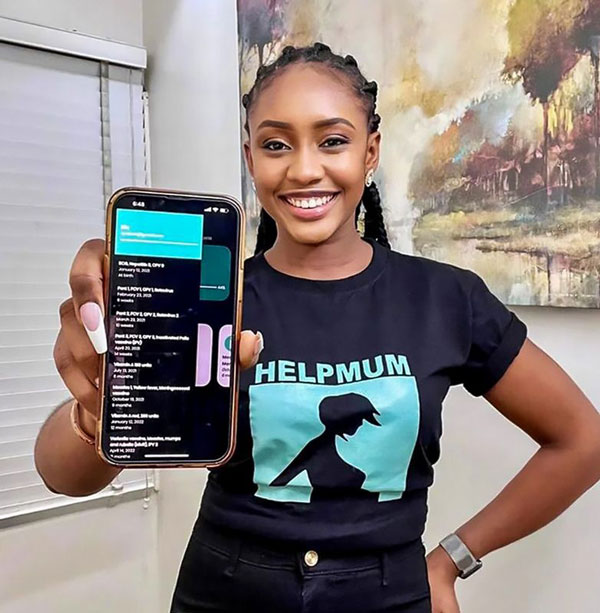
Nigeria has the highest number of unvaccinated children in Africa. Now, a novel AI-driven vaccination programme is showing the way to boosting vaccine uptake by up to 90%.
SPECIAL FEATURE | BIRD AGENCY | Mariam Haruna has been struggling to keep up with her six-month-old baby’s vaccination appointments at the Family Support Clinic in Odaki, Kogi State, Nigeria.
She lives about one hour from the clinic and usually covers the distance on foot, except on a few occasions when a male relative drops her off. When her child is due to receive a vaccine, the vaccination officer contacts her on the phone. All too often, she cannot get to the clinic.
**Vaccination Coverage in Nigeria**
Nigeria’s 2021 National Immunisation Coverage Survey Report, published by UNICEF, reveals that only 36% of children between the ages of twelve and twenty-three months received all recommended vaccines in Nigeria. The remaining percentage of children either did not complete their routine vaccinations or were not given any.
Nigeria’s record of 2.2 million zero-dose children is the highest in any country in Africa and the second-highest globally.
The West African country’s low vaccination rate puts the country at a higher risk of disease outbreaks, including rare diseases like diphtheria, a vaccine-preventable nose and throat infection. Since the beginning of 2023, diphtheria cases have risen, with a case fatality rate of 12.3%. Children represent the most affected group.
“We need to understand why mothers don’t take their children for immunisation, and that is one of the reasons we created the HelpMum Vaccination Tracker,” said Abiodun Adereni, founder and CEO of HelpMum Africa.
Launched in 2017, HelpMum partners with state and local governments to deliver a tripartite intervention aimed at promoting maternal and children health — the Vaccination Tracker is one of the three interventions.
The nonprofit’s vaccination tracking system comprises a database of nursing mothers and their children. These mothers are captured in the system after registering on the website or via the Vaccination Tracker App developed by HelpMum.
Nursing mothers who download the mobile app can self-register and follow up on their children’s vaccination schedules. The organisation uses information from the vaccination tracker to send reminders to the over 80,000 registered mothers.
However, the organisation has noticed that even though they make multiple phone calls to remind mothers about their children’s upcoming vaccination schedules, some mothers, like Haruna, still do not attend. This complicated behaviour that impedes efforts to improve vaccine uptake drove Adereni to seek a smart framework that guarantees results.
**Incorporation of Artificial Intelligence to Improve Vaccine Uptake**
In 2022, Adereni collaborated with Vanderbilt University and Google Research to design an AI-Driven Vaccination Intervention Optimiser (ADVISER). The ADVISER model is a standalone tool, but it is fed data from HelpMum’s vaccination tracking system. The first phase of this AI-backed vaccine uptake programme intervention has been deployed in Ibadan, Nigeria’s largest city.
“We have travel voucher, phone call, vaccination drive, and bus pickup interventions,” explained Adereni. “ADVISER recommends the best intervention we should give to each mother registered on our platform.”
Travel vouchers are distributed as monetary incentives to mothers who live far from the vaccination centres. When distributing travel vouchers, HelpMum prioritises mothers who have relatively lower incomes. Before introducing ADVISER, it was a challenge to identify the mothers who would benefit most from this intervention.
“ADVISER has been trained on data, so once it recognises an input, it already knows the most appropriate intervention to give,” Adereni explained. “Generally, ADVISER processes information from our vaccination tracking system.”
Within the past three months, 1,113 nursing mothers have received travel vouchers. However, the AI tool does not track how the money given for this purpose is spent.
For the bus pickup intervention, the AI tool identifies the best vehicle routes. Eligible mothers who live within the area are expected to walk to designated pickup locations, where HelpMum’s bus will be waiting to take them to the vaccination centre. Guided local search significantly supports ADVISER’s ability to generate vehicle routes.
Even though the AI framework predicts bus routes well, HelpMum’s ability to deliver this intervention is hampered by inadequate resources.
In Ibadan, the first and only city where ADVISER has been deployed, there are 721 primary healthcare centres and 1.7 million children below five years. The nonprofit only has one bus at its disposal.
“Considering our capacity, we can’t reach everyone,” said Adereni.
The phone call intervention is the oldest among the four interventions backed by the AI framework.
In 2022, HelpMum completed over 75,000 SMS and calls to nursing mothers and recorded an additional 22,466 reminder SMS and calls within the first three months of 2023. The phone calls are made following SMS reminders to the mothers about their children’s vaccination appointments.
Folorunsho Nafisat has received messages from HelpMum since her baby was nine months old.
“Now my baby is four years, and they still call and send reminder messages,” she said.
Before the deployment of ADVISER, Helpmum’s vaccine drive intervention involved promoting the Vaccination Tracker App in primary healthcare centres and private hospitals in Ibadan. The vaccine drive intervention is now focused on providing vaccination services directly to households and could be held several times a week.
“Sometimes we go three or as far as four times in a week,” said Adereni.
HelpMum leverages the AI tool to decide how many households to visit and which mothers to prioritise during a drive.
“Before, we had a 45% vaccination outcome using the vaccination tracker system, but with the incorporation of ADVISER, vaccination outcome has increased to 72-73%,” said Adereni.
He believes that logistics issues have significantly impaired the efficiency of the AI tool.
“For instance, a child may be due to receive a vaccine, and ADVISER tells us to give a travel voucher to the mother, we might call them, and they would have relocated,” he said.
“With more research and as we improve the efficiency of the model, we should be able to get to 90% in the regions where ADVISER has been deployed,” he concluded.
Adereni is optimistic that ADVISER, the first of its kind in Nigeria, would pave the way for other data-driven programs to improve vaccine uptake.
*****
SOURCE: Kate Okorie, bird story agency
 The Independent Uganda: You get the Truth we Pay the Price
The Independent Uganda: You get the Truth we Pay the Price



